Gingrich, Virginia, and the Pundit’s Fallacy
Those of us who obsess over politics and policy on a daily basis in no way represent the typical voter.
As noted in several previous posts, Newt Gingrich’s failure to get on the ballot in Virginia is an indication of both the weakness of his campaign organization and the oddities of our electoral system. But much of the analysis is a variation of the Pundit’s Fallacy, the notion that those of us who obsess over politics and policy on a daily basis represent the typical voter.
A case in point is Katharine Seelye’s NYT piece “Gingrich’s Ballot Miss Could Shake Voters’ Confidence.”
This misstep is bad news for Mr. Gingrich on several levels. Virginia is his adopted home state. Failing to gather enough signatures in one’s backyard creates an image problem, at the very least.
“It’s a disaster for him,” said Larry J. Sabato, a political scientist at the University of Virginia. “This sends yet another signal to Republicans that Gingrich is not able to organize.”
He added that such a lack of organization “suggests you’re not a serious candidate.”
The failure to get on the ballot in Virginia could also shake the confidence of voters in states that go to the polls before Virginia does. Why, his supporters in those states might ask, should I throw my vote away on someone who might not be competing in other critical states?
[…]
But whether or not there is any practical effect, Mr. Gingrich immediately began suffering a psychological effect as pundits and people posting on Twitter questioned anew his ability to organize and his credibility, in light of his earlier declaration that he would make the ballot.
This is all swell except for a couple of minor points. First, a vanishingly small number of voters–even the more hard core voters that tend to show up to vote in primaries–has any idea that Gingrich didn’t make the ballot in Virginia. Second, few if any of them are going to make their decision on who to support based on which candidate’s organization did best at jumping through arcane hoops.
Normal people just don’t think that way. If they like Gingrich, they’ll either be angry at Virginia for excluding their guy from the ballot or rationalize Gingrich’s failure in some way. If they didn’t like Gingrich to begin with, they’ll use this tidbit to buttress their pre-existing view. If they’re truly undecided, all manner of other factors will be more decisive in making a call.

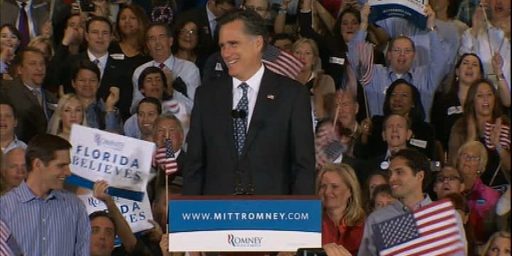
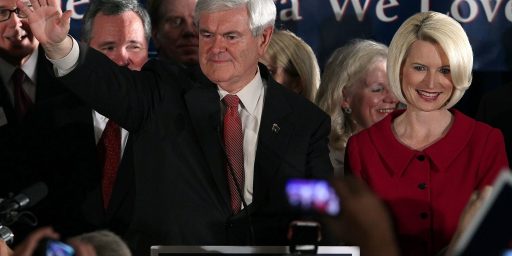
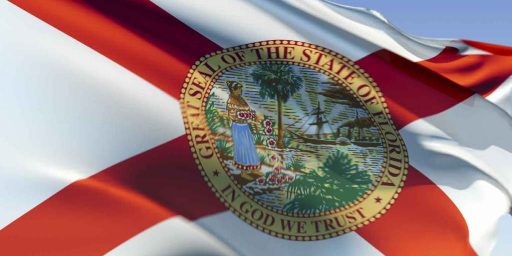
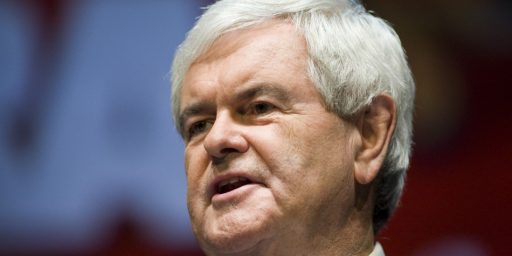
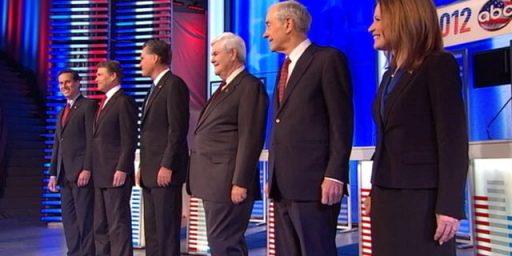
Gingrich didn’t gathr enough signatures because Gingrich doesn’t want to be president. I don’t believe he ever did.
@Ben Wolf: Oh, I think he wants to be president. But I don’t think he thought he had any chance in hell to get the nomination and acted accordingly. My sense is the whole thing started off as a publicity tour and he suddenly found himself as the next in line for Not Romney.
@James Joyner: Gingrich the opportunist? Why don’t I have trouble believing that?
James,
I think you’re overlooking the extent to which the nomination process is affected by people other than ordinary voters (donors, for example).
If I were a Republican donor right now, I’d have my chequebook locked away in my safe deposit box at the bank and I’d wait until the rubble cleared before I gave any of the candidates any money. This campaign has just been too weird.
I’m beginning to wonder if Andy Borowitz was right about this year–the real GOP candidates have been captured and locked in a basement until after the convention!
@Ben Wolf: I’ve also been under the impression that Gingrich doesn’t want to be president. Consider the timeline of his candidacy:
1. Leave Fox News (a decent gig, but not on par with his 6-10 speaking appearances a year that net him a half million or so) to declare candidacy.
2. Essentially give up on the campaign after < 1 month. This is a pretty good indicator that he had no real thoughts of being president.
3. Hang around — that keeps his name in the papers, thus increasing his public visibility.
4. Make himself sound like the "intellectual". This is the only step that's potentially problematic, but I think it's undone by…
5. Stock increasing? Time to make a whole lot of pandering statements aimed at making it sound as though you know what you're talking about but are unelectable because your ideas are just too "out there". Note that he isn't making entirely stupid statements — i.e. ones that even the marginally literate public would see as "stupid" — but is making comments that turn the pundits strongly against him.
6. Make "primary election" mistakes. This absolves Gingrich of the need to talk anymore (watch him shut up in the next couple days — he's talking too much and is taking heat, so it's time to duck out of the warzone) but still automatically stalls his candidacy.
I'd say he had no intention of being president. Indeed, my guess is a look at his campaign's books would show that any money that flowed in went straight to organizations he's profiting from (or plans to profit from) or organizations that profit close friends. I'm going to guess he'll make a few $10s of millions out of this election cycle, up his speaking fee by 50%-100%, and end up with even fewer responsibilities than he started with. Not a bad way to go.
@ptfe: What really made me suspect that Newt doesn’t want to be president was his remark that he’d appoint John Bolton as his Secretary of State. He didn’t list Bolton simply as a possible choice in his administration; he definitively stated that that would be his pick, period. I’ve never heard of a presidential candidate (particularly one who hasn’t even been nominated yet) making such a firm commitment to a specific cabinet position (besides vp, of course), and it doesn’t sound at all like the kind of remark someone who expects to actually become president in the near future would make. It sounds like a guy starved for attention, secure in the knowledge he’ll never be held to what he says.